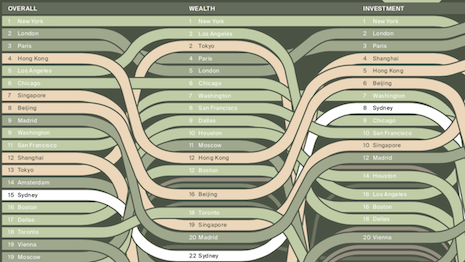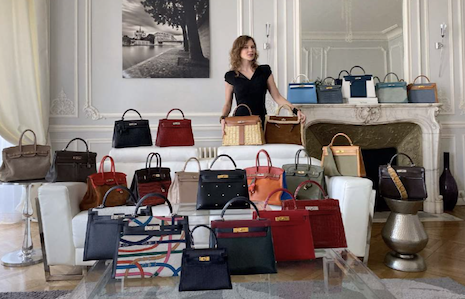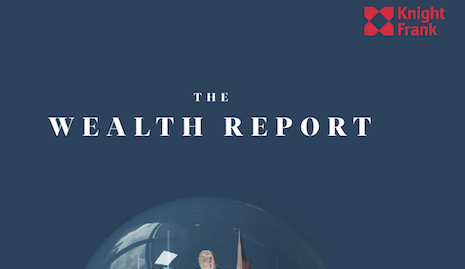Luxury real estate buyers are spending their money in cities as opposed to second-home markets in the shadow of an expected global slowdown.
Per Knight Frank’s Prime International Residential Index (PIRI 100), European and Asian cities had the most top 10 cities on the list: Frankfurt led with 10.3 percent of sales, Lisbon was No. 2 at 9.6 percent, Athens earned 7 percent of sales and Berlin 6.5 percent. In Asia, Seoul had 8.9 percent of sales, Taipei 7.6 percent, Manila 6.5 percent and Guangzhou 6.3 percent.
“Despite wealth growth and interest rates in most advanced economies remaining at record lows, the slowing global economy, rising property taxes and, in some cases, a surplus of luxury homes for sale, weighed on price growth,” said Kate Everett-Allen, head of international residential research at Knight Frank, London, in a statement.
Britain's Knight Frank is one of the leading global real estate brokerages, also producing industry-standard research on market trends.
Leveling growth
Knight Frank’s Prime International Residential Index (PIRI 100) tracked annual luxury residential prices in 100 cities and second-home markets globally for 2019.
The average price across these locations rose almost 2 percent, up from 1.3 percent in 2018.
Prices in Athens and Cyprus were up 4.3 percent, but remain 35 percent below their 2008 peak.
China’s cities are no longer seeing 30 percent annual growth.
London’s luxury real estate fell 2.6 percent last year, yet it may be bouncing back after the pre-election uncertainty.
“While growth ranged from double-digit hikes in some markets to significant falls in others, we saw a shift in the trend of moderating growth that has prevailed since 2013,” Ms. Everett-Allen said.
 New York leads real estate investments among ultra wealthy, per Knight Frank's Wealth Report 2020. Courtesy of Knight Frank
New York leads real estate investments among ultra wealthy, per Knight Frank's Wealth Report 2020. Courtesy of Knight Frank
Start spreading the news ...
New York has replaced London as the most important city for ultra-high-net-worth individuals (UHNWIs) to live, invest and do business in, according to the Knight Frank City Wealth Index.
London is now in second place. Paris, Hong Kong and Los Angeles round out the Top 5.
“It’s no surprise that New York has recaptured its position as the city that matters most to the world’s wealthy,” said Flora Harley, associate at Knight Frank.
“If you look at the number of UHNWIs residing in the city, the opportunities for investment and the lifestyle on offer – it is an incredibly appealing market,” she said.
This year Knight Frank also created the City Wellbeing Index, or cities that focus on quality of life as a means to attract entrepreneurs, skilled employees and hot companies.
This assessment looks at factors such as personal security, lifestyle, healthcare, crime, work-life balance and access to green spaces.
European cities lead the City Wellbeing Index.
“The Norwegian capital, Oslo, takes the top spot of Knight Frank’s first City Wellbeing Index, followed by Zurich and Helsinki tied in second and Vienna in fourth – unsurprising, given its decade at the top of the Mercer Quality of Life Index,” Ms. Harley said.
 Secondhand handbag sales increase among ultra wealthy, per Knight Frank report. Image courtesy of Knight Frank
Secondhand handbag sales increase among ultra wealthy, per Knight Frank report. Image courtesy of Knight Frank
In the bag
The ultra wealthy are investing in handbags, and some are paying six figures for vintage luxury purses.
The secondary market for handbags is on the up ever since a buyer paid $386,000 for an Hermès Himalaya Birkin with white gold and diamond hardware at a Christie’s auction in Hong Kong in 2017.
In response, the Knight Frank Luxury Investment Index (KFLII) has started tracking the price of handbags at auction.
For the initial report, the analysis focuses on bags made by Hermès. Over the past 10 years, Hermès purses have more than doubled in value, rising by 13 percent in 2019.
Proceed with caution
As political uncertainty, trade wars and coronavirus pandemic ensue, a global economic slowdown may have arrived.
Four out of five UHNWIs said they plan to adjust their 2020 investment strategies, according to Knight Frank’s The Wealth Report 2020.
The survey included feedback from 620 wealth advisors managing around $3.3 trillion. These advisors said the global economic slowdown is the driver in this shift in strategy.
Around 47 percent of UHNWIs said they plan to increase their allocations to private equity in the near future.
Another 45 percent plan to increase their cash holdings and 44 percent plan to invest in gold. Forty-three percent will invest in real estate.
Some 38 percent of money managers plan to cut allocations to equities in the near term, more than any other asset class.
“While many are sitting on their hands waiting for clarity, those with the most at stake are changing tack to protect their wealth,” said Liam Bailey, global head of research at Knight Frank, London.
“Whether that be seeking the relative safety of gold, or the diversification across geography or industry sector offered by private equity and real estate, the world’s wealthy are actively responding to risk in a manner in which we’ve not seen since the global financial crisis,” he said.
{"ct":"s11rAgorG9CcznIbgPlkP+I2B8rgKVMzUmsjmYO\/0ctUM4TUQKIx593HKRCkEwEOenxUMSw0radqwfUstnfmsU4vAqoDXGNch1AqocZtxz99QwjRCHpJ\/KsTgHPdYnC20od6HlduprRHzE7dg64\/+mm2Hc\/2syHZaJ6TVndwz77T+QCUKpn6odmYNqXRfLJajiB5woQ2+ZhtV9cwYyGabEY4lhTsUkxGeFUUl7nbvf6Gpf4ajTlGDOlNN+6rgyReUiC8yrVC\/ioKSnPYUr4at3R7MbqBhldt8AjLB0xkmk634\/43\/Vf6X4vvQi34AYE2wYMj8Fp6P5kkPQ0+bF3gx85FZSfofMB355GXQBhEFHz9qObQtbhX4YemfzcBm7M4zKKuQ93eU+3q47xgfZ7sesymThJsawYXq7sjnA7octWdBFZ9Dp2buL9N8PjOOzt9cnorG57+VFfIS4d5js7y6O+uAid9diE3BPaM7fcuTcxfx4aGxxODLu9SuM4AVc0nsYhaR7aPGjfXUcvV+jvcicUo0mo+IfkTGmtW623L\/YaAQp92YOwsdtYL1HqOfZ9+hLR+wo+RDNXnAD9AYZzzCd71CKNNzfgCp2JiUlUeKfDSp\/czOSLeJnzGtY3eL05\/cb+K7dCVmhmKvnt2NffFK\/nAqiZnWImCx01JfPO1JXh5RF1PBGDqplYJ0A9EtsP4FCLJpXcygY7wpdbOXHnEhAgoUa+nVK81ggMVTQlMOEQnQeqlAbZcO+\/ZJJoceLZnKXP0ET0ZfuWZS6miXyHDKDfOTTloY+t64Jj\/Xs3npo7zqgD0sxqCNZWFx7Z8Xxtf3jdkom9SfLYpqh6z6kSa0sZ98hCgAC9VuvvYLlF3JdKSy3L1Y6p1pKEljbF55LU6CNjwi40erzN8bHv951X5eEVQfi7t2Jy6fYN3bI38ZtD8up+Xah9KZHbygtlx+rEdbtsytCcETW0sQtIvxK1\/3d0X3dAiwlpv4pJw25NfkQQEyWJNfHTnuT9kW2aF0ADgDx8shguvqH0pJaZwP9vISYZPSy1UKyfdXOqYEVVIs18wnhvT7KxH2wH9fQRYuHrPifkJuGXW+\/Qh0gf9XvkILD3GtQooHpkpXJPJHpuBEr\/xv\/5enZL1L8ZbLO4cetF2vloIUzv8HkF0i0AOca2YvDBo4AKRKSoo7tAVUeUcIN88WVayah0krT73oQ2ibhNmoPMU3SzrmoEeC8vYQxge3T5F8tN2laY8ntBnGgCe8xUr3Yy1yKWk6aZnxE3bQCg3i+rkHoX1vmohADXiRH4HDr6e0yJzy1FLpECVnyPGD8oVOjWwkB57SP8UUhXR\/karDhtDhGJGYcCAFfhKZJvsVvskEihOdXL807sedknoc2jp2rXvCz4lzlBC7uYS2gp4CwYYRDDXF+a7QG2M2D6cBJsuSANJ5h5zy30utlhNlKXSms34CMcaoqDZQf6B5mTUdjnsO1GKmAAswbHNBoeUyGLy01XF1X4tlEPQN42+U1RF4umKCdF4fwRzwX8MTUXIkrImdWX4hOrlGnMnERm3G0plg5dKHdMWGE2541Dtos52jPYVDEQ7E42xscJDp5Q7CgP7szbAxW8zKnrMuczTlWe\/0v7jB3xQH1VKNCAejc03lMpyRxX07H1JY2lWHXuifbQApeQvNyWGECBDNlkNqaB0xmjkmY2zPzItmoidRdu9jzyunHdk57U9fLsuT+S\/KGNyAcwgxji9enoQEF+d0Dn3fGGlK6APevCCK5vj+1\/Hr2synBsgQCBhfsHCPkrz3sPVvMKVIx\/HbcyMrzE78TLqdnFyKqwfQ315z8Dt5ZBgrY92VKT1KK6qipZ6WKZMUMwmrojGtt1Biu5LvWDmJQIDLp0XdpOuyUh+ZPDnBztq8MN2RZ6OV01UvueAjtCPSbnRxrkEGl9jnPMYvbIuZbKgMp7H+nsx5YLZahOj1parshyPMmAzQSly3MMhQJ7c1oKVbjx6ecBUGFOIR1BLUjdh+YrBpVAzfr9yDBUeFbhmir5XxahtXaj8CxBZWAj3cRv+RICf4BRTnBZ6XZRlS4zL3k73XYBW+Cv7CP4U1V3sFoU0rFUyNRELBIBJneVc\/CEJdtHaa\/zfPRgeZpdRSZDNvSRvT3VPnRhK0QP+ma8mNl4Q0LxIAFHuKP3oNnw6cV0UvEVZvMffsDoOriaEMyI2k2ptMdp0ty5SKHcNNjgcEIIcCU6rztqvvnmpAoQbRUuZ+MVu4u4ZJOp9M+\/dld1M4hI\/XKM6N68vlh+Og3vxfc1y3+7rfAQkuMLxPJ+ywg607Bf37NC6DYx1ursLmUiu0iqqA1NLWxb8uB\/aT+qJGks7d1u5MoNW7IbTvDZxhd\/fPuNXsr4hzsN0r7RzEmH8YCM4Gp\/xQKekGiZxDqacDvHpwHqT+KSznG4HLZnm1OHuOlxp2C0UbhJwPaXx6A549bB+k1IgFwtksk+ra53dyGVachbVrbNV6yQ+BhVfehpagi\/xUh45CnmBM7VP7rxye\/mKuGPLr2n\/PoJZrBI\/Px59X5Sb0Kixf0jiSgIW4KoIUrFJUY7XSZbwhpgS3pxMc4h+FMVYeNpM5cHwwSNvG0NzIaQHLjoSO6ttyL5DdqjQubpXZtunsbRFP\/sk50LJh58YHxsEhZujZfL+FqB7GCJ3aECjIwomY8f3cT12N4X9aE4nSI0lMxg7VKQLRjhG3l4+UCrJKUV4PKxTpD++XQ+nea3NOiboDtp4l2JGMhj3x9bj3VszWaUWZa8Q\/oG7JuapUg3vMLJphrxB9l1c1yugDTNtMum6XPL0Q9984kvGdkT4bSW+oDtGvmHlPMqs4x8ytPJuDGfJPbLQlkAa9mnnqgsWO8yd2+rdDV\/BZlnDd+kQoHg2hYz8zV01eckbWl+gyivUWZU9T0XAuGpmKH0+UysqSml+lHxjN5kszMZjWE2kFtjlGJwe5iJCoxs\/CYazocOCFIPTPy9WhpOkM8163qW5tnLNBZFv\/T1Pv+taQ8C4f3+Xuhk1Kzr2HwNZ3iarZJ5WORpOZlq6zr92yQceeUzBp3JxbSj19Sg3ACDiuTBZ1mSoI3\/L1fGxcvgBfALGKby5ezv6+iLDHV5+GXNWq2h80kqg3EvKBKpTzjCdyM5BIr7kiAzgTwfXrsyYGDJ7KPvCAB4IrND7utXD0EE72Ji944CBr0uVZy7+ZrV\/D\/bME9J\/LIcTh4c\/nNRKsz3ZWbc+nlNTlQh4Ot7mriZECZIVAEaNR8mGckb9SOoGVBSsKkrEG9uu43iBDlKcdCBV4FKH8myy+oVGshG+ZsWPOyBtc6MO05ud2Fwb\/GQXqou39Ercg1V9g4zqZnee7HEgihKy62TSyiMRifyRbytO0l6wmv17YfVzNgEM25JETX+7tNEsZCqoH\/WtLJsGR1vkUDhLqSCO6c8bQHqHeWh8xH77ebFXW6KeizuQfI985x+rTOtLg5E+Mu21rsikkTRQYysJOIRbMHUQjA8T33o+2piMuRqaqUOQHeIJSE97gz60phIm52M15GLQRY3M9T51d+v8EhE5Q6VAJ8cbolgHxLq5FSb9OFVoQT84CpvvVtVG264tDLDIfvY5w0zFDWW98cxtiqFj8tn6uPgKaZDHvh\/f6i2cUBH2SI\/UEzq2JTSBi62c+DSp\/srkkCGJCD44BhuIyDT8oBEgXYYhkBZCIMW9HwFCiQOWjMjmVazAh5oIaps2bcTeS7drqWlyPMXKyj1iNCJBr\/Al30gEfeH2OLaTtriYQVCrJXdJjFXlfT+dlW2R\/fG7ANoxc69PDfZnn4G2+LNVbGEbA7LarapZPx093cTXYQBkMpFkn\/LLpNYRUSBHl\/F5e04CGhnf78fCQVRMplVlXgiJbPBJaikpmo+RZFPqhu2gh7VJZL7uz2q0He86gcbtinBqxk8QAUcEHcEj\/VQ\/pu3AJIfiOrhYi2ndW+NEFsSmhorALHAsV1YJPb3YtyyCuEDlxmp0yL3XLy8GEd+hxjzDb6arxwOAG2GY3lp14Hi+T4u6T7+SpRIpUSxo8TTf7IpKXhzv1eaxKSnBOpSRcph16+S76ckFcmW07DLNL2uxo2e18ngDlCTlbQxLBxP2sW7eEXeM74BO\/EUKNaLw\/IrlOJ0gQfRIoUDMRv\/55w7zHHv9RIAFtbd7pfFQJBHzir\/nUTbB6GGPcP\/Dx7a72Z96JubsYZYfzY\/U2z3jczcCRDuHLlGtS7E\/YlsF2zLngEBQVyhP9UTEmqT5daD5ahuWz1Tq1VjMdOGXoGXoEFL\/M1W3goVA5vApPcSfPIrvnLXmTmf2Hs4Grl5rFBGufwF6tyIdAhPN\/PMsu4N5AOKckLfpo5md+QcO8RooyqSqUyIrVsuFeDELLYEnWlZ8n549tP1\/Z7GoZlvkLp\/A1imw8ERnR20Z9P14HnKkWvKLkGYtHFKFy+HQygPB44BcX8Br+IIt5ZKbp4i0cUzPh2Sk2LA9duuFdrCE+cF1M2+yLhK+05NGzs62aCn8A7I6kJQo38y49RLqzeDi\/+RkLjiATSwL4puyJASK\/eob5xXDjfD30pNw35VDnxY\/CENXCuBvHDXu0PVF2PJ2oqYSiXWgVHFh\/W8KfzUzCP05x9bH0GJiIF2RMPsgeO3JeGr3efPohms+y5CCkqlNlLZMdAcHfBR6c\/bXrLbDbFzOTe8X2NAQIfajMgh13vtMjXtEGNyLQaPD2Os9ZM6Zx27sw8KE8n2n\/hDGRmz3AoMRmRM2ZtrW0iKxO7hE6j\/QnfT7kH9r5Dh0jLnbR2BrVU7NcsPOXcXORUcAC+jlSMbSMd6fnu2CjtvicW3yG8D9c0ZS3Hy6fiu3mo\/AnXvwkEe8UwbXbzBYlMcZccQFsVn9ad5CXZEmAdZHmwScdTXya8GW2C+zJ+S3e7SKT0QjIGXudrXsMbMQcRCBqUJudWQfqNqR+17QfY2Lkcn7gBEjcxmpQPPiq9Qvl+nyQzfMlL0OtaxUwQyIdtEj8PuAUPrdTVBJkcL33dOsBsth+FpDIV4mCveCWSlbVNmA5IKEcsga14S\/jp0SYk8TCyDr0hK9dDvEX77RBRp+\/OaO7hmrnJPMeHj9\/oIH7+JLFVrLfZMz5ZYaTk1pi5DYP7zuQ33P6JoAwJEkHU56KfUaH\/1BLL2DL7MolmQv\/qDHNkqvRPEGWRF1vnnhotzaigjy8zwVkj\/\/0Z3PWd\/etr0vKWZGSBzMQXgoLM2Zx52MNQ2tp2+TZD\/lzSxOFM1PvsTRispE0wrCy\/RFTju51tt38cXNQjSXxNZBKecEspR9zc8MMC5Pz8dtWzU4BsAeIXLoeBblg8BewRXqDLDyT+pLGJop0JZW+NvPLevopPL6nbGSgLjScWMfE7lTgpMA3\/hgXd3e2fd7wH8XGD5THmc70QbLgDG21LSJMn0tKBwrsoltsfjVawyDA171ZO+rJ\/IhyEoBd\/3CDIodYZEURUxMkWB8odrAJpPZHSIiRxXnyL9qSVFY1EJW5F9wPoBWav6oovDNv5vl7cVgZzsc\/T2y4DoQeKD2qF88auqPD7se\/DXxOgDEmdS6juzTosQnh9Dhl+9Yoloa4wMq5mdoKgFjcV\/vFmz6AByZZiZ6CBBOAPAwTXTvXxl1ESlvTW4DRvpBF2NHlVOZpUPfHIlITyhYY6A1cahnQ1OQoD6\/\/AyXxUtIkFal+7pz+2x8qquFWq4UHKyKd1m0XqAqxa9Ss3grg\/DTNOVaXYSSN2Sklg1woUYliOhoIVNK9CxRGbSuHc6qL1pcNQOn1l7op94+7vq96E2WNQ3lTa+NBghK6oXRAcsshYt5yTnmgWXK4CgtCJPa6y\/mNag\/O7COug31TN63UEb+cdxc1vJQ2lOJkDYyiewaRSH+JUbp3PtO18z3pmH0Wk2IDC+BL02f8saFXNkcqh9QHTPNkik1G5l2JZd7gDdNoGI3+VjoSKc2X04KxZChOHbx9qK7MU1RnHhp2OMrGl+PJtrizrDBGDTnwKt3MX74aggylPAjen\/sfHtQ5\/QD8y0ZFtXd516LeisSgOyIuOB6oxzd8p5zkjL6E8jU0Rm7Qfepnh5ESZOKW23dm89kujrPUxcPGn+Yax7QQSMJVpdKS1dwaUS9FiMsQD6TZA58r5iyBqljRILfmL2JuxTA6obEIPmzNPethLTsjiwusjV0RXq0HYfmi6E7VF5ZleBjriwCpdX1aToxN3i\/N1ktj6M8tpD0GeUohe0GGdCRCjTFtUP\/jyaiA9shTcJe5LFwKjfoDCaQMXkPx4Lau+ahJTfZ48cxi6P6GQ19h6VbbdRZcPQUIwd7A\/eWbyvzDasomcYfNpaYc99pD3qJTi\/uw5bzx8IKNUSZxorYl7oqHvu6B6cHMqLgD0lnys4d4caXqI48G4u+t2u13kAROw08Wvs6D+BvudyFtzd0tCH0Uiy4VRHLdy51ihrjObePKoZY31k7UQQ+JMvBozJtTxzDlQ\/BlgjJA+Am1iObcj9EIggAxOIzzpCJ8OfNE7VQVromOVD51w5H\/WLc+4mI2lgTLWo5tD1fHpfCkdix82zvFBdUBQ7Q0VxrT9CbGdYH0lfWoGwCjjz8zdKBe6ni9u5JqH5l42kTM6KJTolHPHXKxS4864fpxCO0Ke2ueJOP\/DJmGChoqSz1OEmV7E6tIxRge7GY6vHVIAqDc8purreWQ0oPOfgwUWIw5iRpFTj1sTcm9SdPS17CE4zRlD1oKPazJVQ9qifH4MKBw7zyYG\/H3JDYx12CZJ12UWwt+xB0fzTGEQsxOm5RUc+9HBNrJ71YaASv6XZgbHxoO7NswbYb+g6D08VZlFkkXpTB0c4UeeLavORrVpFKFTY0r1tPE2uv8SFXSa6S1EhCTws4LCrWL7HUe\/098lqHIOoc7eKjX0NJvlEbPnFak501GN3yR4YLFydEFd34QgIGm+cCLcZlFqc6CkFa9j2SRP6bCyvEmi3DMDYclfGZ1I42RWl4epvgnYC9QyPoAFmtmu2V7wDcpBZmkljOCxIiF9I97HN0ZD+2Xx1n\/jn0gRIjsdCWLqDXoiN7pl3YVCmvJ59zZweNj4k4qvVewoqHRUmVtfN447KY+lCRIUmwBOI\/LIxE76xNkqpRoeqftbmN9J1KEflZ+l3uoHDsajJsQ\/CW8OSnJxPJNGZ42qA5pRityNb4pmsXvbvKnqaDb0qkA\/rfkWpPqWz2RfBZpHUy5PuqvpN2mGAzZP0P+EUyEyaNmWzCpvMJak\/QW4wWLZILjRZKQZ6N\/a6Wqb\/j0sr\/a7Y1xILM9jOFt0C8rY0E5Ni9xEC1\/NyAEh7OzQjW85rbjavLS\/hgRnMpjCxxMKiQndT9sMflptWqaAvPp+1EsTTDg3YSbYFXUts9Pk1iMkYiQuSLcECKwJtkK5j603z+Q38Q+Y+dJ1dyXaVEJsBXlTNIyEOkRAs2WpdXRJfRSFQC++BlMQ1HwafREc7AQUfzYRTLjyl8BxRgLV0o2lGInGYXJWyhjjRO\/aFUE1qFX87MQ3pMHPNThpkwKoKEMVCHL6RasBoR7I805vE3lDIGG5BZ\/hUW9q4CLg82cn5oV41Mtb1ERO\/5RuCEq8EUOVusDgSA8ppYGlTb8xk9uziBeAJEJFaaMHQhIyjf4UE5EaL\/SJXSlyWwEO9kMqh1P4xbvykl1CQdf\/UZ6Z4coWZWtIVXv3HYORvxW0Mos0LXdOt1Dsbjgm+TklCfmgeAXel8sYNGSpP8D054yu\/5A0YsKBsXOpzI\/HI0Vg7c17lvEDJIeJZTw0eNSJaCK5buJggm4GBM++a0RbxB3Iga2i3NVKeclbTbZnodZiMN7w2OqlbPYJu9oVwM5iWnRUvIzpVwArj8qWk9DXbrOSleY9py0JlT6LV6tGAc1Oi+9OGbj0DTGdLh0hhQet9987I4Q26ecKM1yakozpnVXGnYlZsUy33jCojUNwZ4gnsw4aKUbtw1AZrwzQRKpek7uSHqDurgx7PtZdJ\/\/QlbXHxSCZfhkIFlMkb562if192hkEvXAznJrmcyAazbiOCIaP4Vu+s5uPUbtRwroAI6oNP4gSNlturF0vq5DxPROl2M6fSXYwuNLk6w0FsBQvo+CmZU4CCzRrhDt15pJk\/ozp1Cun3Y13VTZWIjcZfcVdstUdt6OIIsHmvD5ETLhLaIbHgj1g+7y0lw9NvO\/Ao5s+XF7GS22ggfY1kqyhXO7006IcujVJJFHZzWzVs+MNiXHAZfKdhA8vFs3HAtMmrY+yBh9GKH4QZT4zMDIqg49mLiYf05UAa9PmFLegcDcGycEIK6Tm0e4rbIlgmqDmz4kumFN5c2IrGZcQFO++Xyi7s4JaeZWT7HrsUh4gNH+glR86P9+qrBah1hdjcHHJgHXgqBaSBEodw0PrkdGYaucCvdc0C\/uqO7\/kuJdP2Ao3m\/0DgbJuyaHCjendi+8i\/uUKSb8fXMeEBoyspp8ruNZkT6PMaZrAbUBUyXKOoL8vmCh7PLp8HdXtkSlUvVoL7XpA06lAsYQ6rTZdsrCNvZ8EXYx1WfPm1YhYVgsyIlp+8HFktTh4dMBhJ0+opgSx1ceuyiccZ2dS9CNdA8arfEDFD\/Faqd69NU6f1XrtnbhTRjwE81P8YgrhZq5lP4TKx5zGsmaURoIqd08JHSuzHDbqxi3f2KF4Gf5ZNrBKWKJAQpcrGa92+ej5zpK3R4nKoQyp9yIhuOK9fHXI16P7oAjQYEfzc0Z\/aJyr6T+LKgC9PEYqL6XcAuFWR81gcgB21b1wV8wiEz2n+PaGaF83Pq4LO51pw7NloEGBZK9cW1LR\/le+IPt4\/aJm+aEBn99NEACy4s48C6CdLkDjKO91bVdOGYTeXXuOmOugCgT4ayRuLaGTM4jK7qH+ueSoijETn9lba+X7F8B0Dh2wlkxJ+nybpp5DWMaIUgrFOuQyXhe3RkuyQS1JP61n9T8kw3+SfLAN3xBmh7jeGma7rS8+DxcCp5I270R8rrC5ABSPMg5vHyG6jzqEfQ0v2XaQI5oIVNgJEc2Hu5J0aCeNbr5W8tb92UjmLSFEevPN2Db7KihOBngaq9Lhy+0vNkf0zuOSCKov6cHR2YkYfCwXxkfJCOK56nuPrM+JVRbSPrtLhDlJTecX1bYc1O585xbEqS9x2BMrveQXb9kLfIGCArzv9+uOZmUutytLeTCQ==","iv":"e7ac6b4b19f0014c0a90b0057af3381a","s":"b71066c60c143be6"}

 Knight Frank's 2020 wealth report. Image courtesy of Knight Frank
Knight Frank's 2020 wealth report. Image courtesy of Knight Frank
 New York leads real estate investments among ultra wealthy, per Knight Frank's Wealth Report 2020. Courtesy of Knight Frank
New York leads real estate investments among ultra wealthy, per Knight Frank's Wealth Report 2020. Courtesy of Knight Frank Secondhand handbag sales increase among ultra wealthy, per Knight Frank report. Image courtesy of Knight Frank
Secondhand handbag sales increase among ultra wealthy, per Knight Frank report. Image courtesy of Knight Frank